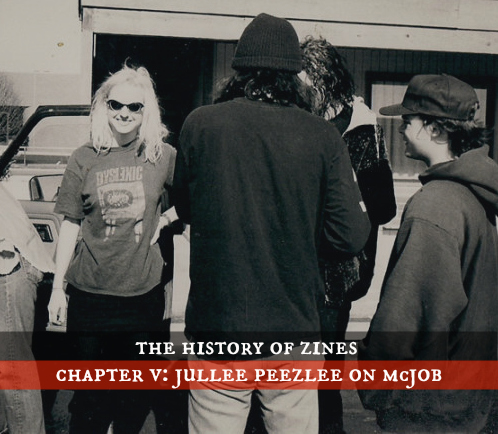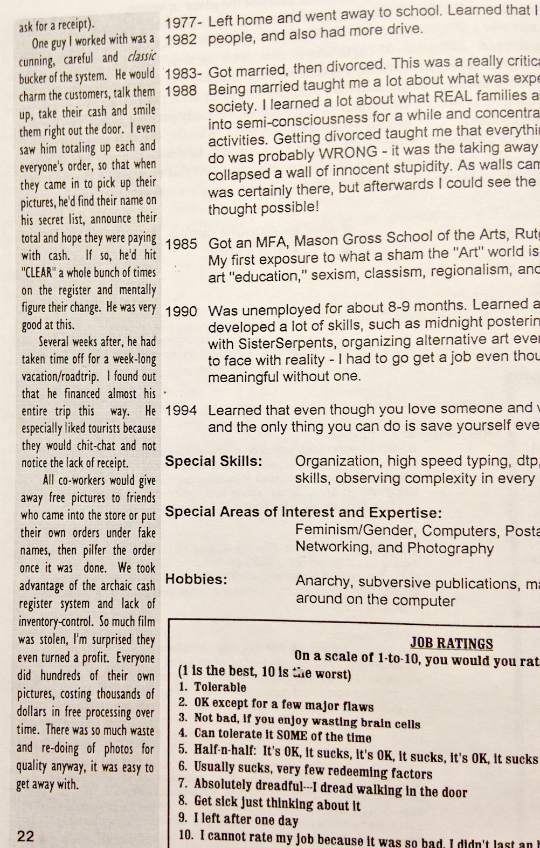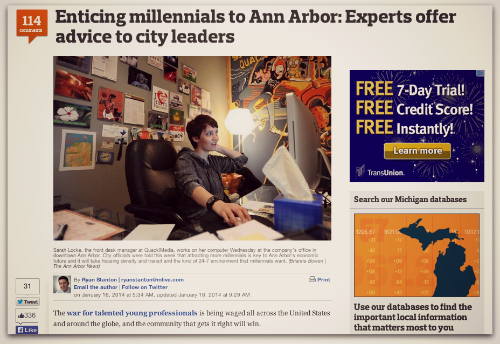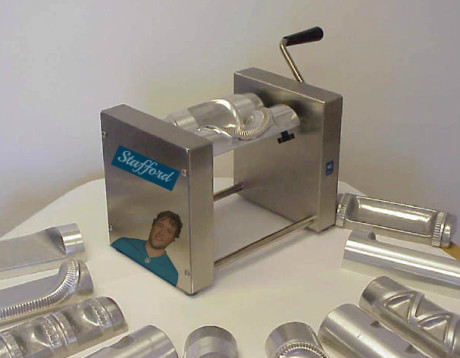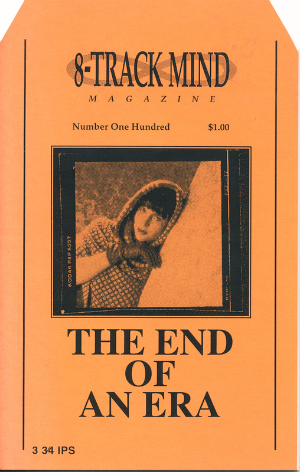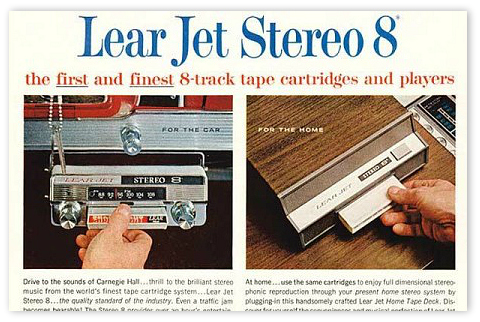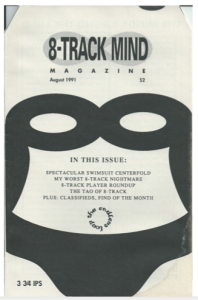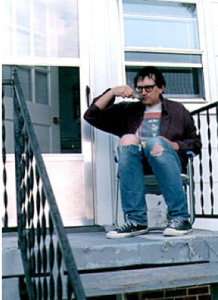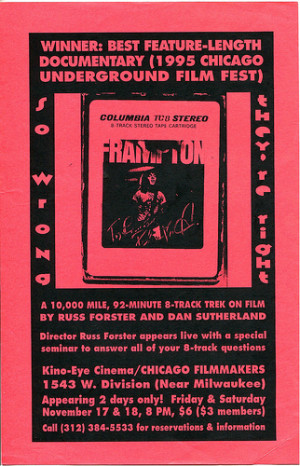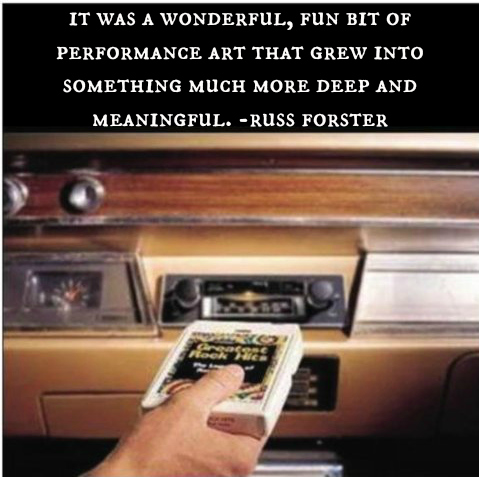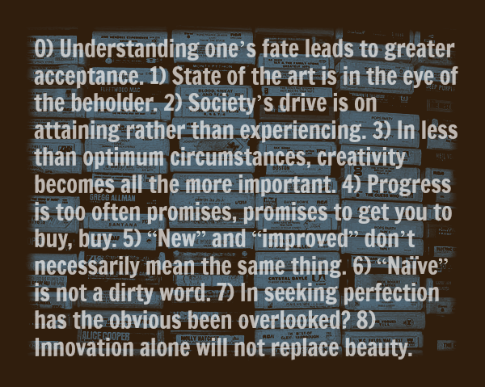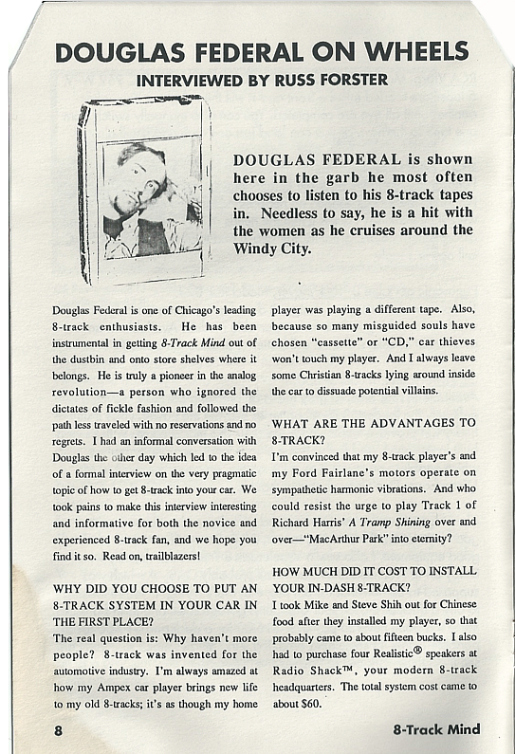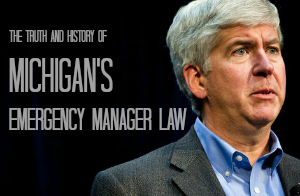In an attempt to better document the little sliver of the American underground press that worked its way into my heart in the early ’90s, I’ve given myself the task of reaching out to all of those former zine publishers that I know, and asking them about their motivations and experiences. Today’s interview is with Julee Peezlee, the woman behind “the zine for the disenchanted wage slave – overworked, underpaid and bored to death” – McJob.
MARK: Let’s start at the beginning… Do you remember the first zine you ever read?
JULEE: This is a hard one. I think it might be the zine that my friend Mark Brooks was doing when I met him as a freshman in college. He would go to Kinko’s and make it, and I was never the same again after seeing how easy it was to self-publish… This would have been 1988.
MARK: Where did you go to college?
JULEE: University of Colorado, Boulder.
MARK: Were you born in Colorado?
JULEE: I was born in Chicago, but I grew up in Denver. I moved to Boulder for college and lived there a few years after graduating.
MARK: And what was Mark’s zine about? Do you remember?
JULEE: It was a comic book called “Mongo Boy.” It was little… like a few pages long, and about an eighth-of-a-sheet-of-paper in size.
MARK: Was McJob your first foray into publishing, or were there other publications that preceded it?
JULEE: There were many other zines. I published several chapbooks, art zines, copier manipulation pieces under the name “Dyslexic.”
MARK: And this all started in ‘88, right after being exposed to your friend’s zine?
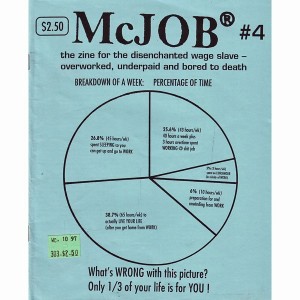 JULEE: I think I was self-publishing by 1989, and by 1990 I’d sent a few things out to Factsheet Five.
JULEE: I think I was self-publishing by 1989, and by 1990 I’d sent a few things out to Factsheet Five.
MARK: Why did you choose to operate under the name Dyslexic? Are you, in fact, dyslexic?
JULEE: No, I’m not at all dyslexic. And I can’t for the life of me remember how I came up with that name. I’m going to say that maybe the word just sounded cool.
MARK: Thematically speaking, what kinds of material were you dealing with in those early forays in the underground press? Was there, for instance, a political motivation of some kind? Were you rebelling against something in particular?
JULEE: I just wanted to do something very different from the zines I saw in Factsheet Five. My first zine was called “No Poetry.” I called it that because I found that most zines included at least one bad poem. I was an art major in college at the time, so my motivation was an outlet for my art. The cut-and-paste xerox art medium was new at the time, so I was experimenting with that. Xeroxing one piece over and over to get an effect. Cutting, pasting, collaging, and then mass-producing through xerox. The content was secondary. With McJob, the content was primary, and the medium was secondary.
MARK: Did you make that shift consciously?
JULEE: I think McJob came about after I had more exposure to Factsheet Five and the “zine explosion” at the time. I wanted to get in on the zine train and what better way than to vent about my miserable job, and get others to do it too.
MARK: Not too long ago, I was interviewing Greg Hischak about the evolution of his zine Farm Pulp, and, when I asked him about making the transition from found text to his own writing, he said that it was surprisingly easy, due in part to the relative anonymity inherent in the format. Did you find the same thing? Was it easy for your start including your own voice?
JULEE: Yes… I agree that the anonymity was key. I’ve always been a better writer than speaker, and I couldn’t believe how easy it was to lay out a zine, copy it, and send it to people. Before the internet, that was extremely novel.
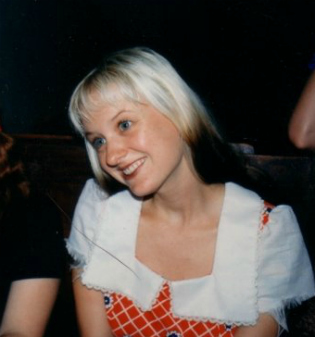 MARK: When did you release the first issue of McJob?
MARK: When did you release the first issue of McJob?
JULEE: Hmmmm… 1993?
MARK: For folks who may not have ever seen an issue of McJob, how would you describe it in six words?
JULEE: Dissatisfied, low-wage workers vent their stories.
MARK: Now, what if I were to give you unlimited words?
JULEE: That makes my brain explode.
MARK: And what, if you recall, were you thinking when you launched McJob? Did it occur to you that, after exploring different ideas under the Dyslexic banner, that you’d hit upon an idea that needed to be nurtured and explored in more depth?
JULEE: Yes. I was just tired of working at humiliating, low-wage jobs. I felt I was smarter than that, and yet I wasn’t able to get a job that I liked. The quintessential art student dilemma. I just wanted to be paid to do my art, but of course that’s unrealistic for a college freshman just starting out. So I collected other people’s stories as a way of dealing with the anger. Also, I was interested in writing, and it was a vehicle to do my own writing. I think I said in an interview at the time that, as a shy woman, it was difficult for me to express myself verbally in conversation. Other opinions would drown me out. So McJob was my way of having a voice and saying, “fuck you”.
MARK: And was it liberating? Did you accomplish what you’d set out to do?
JULEE: Yes, for a few issues. Then I got bored of it. It became a chore, work. I guess I took it as far as I could for myself.
MARK: Do you remember the moment you decided to call it quits?
JULEE: After the last issue of the zine came out, I was contacted by a literary agent in New York City… Or did I contact her? I can’t remember… Anyway, with her help, I put together a very serious book proposal to make McJob into a published book with glossy cover, etc. I spent a good six months researching how to write a book proposal, organizing the outline, writing the proposal itself and tweaking it until it was perfect. The literary agent sent it around to six major publishers (Avon Books, Simon & Schuster, Hyperion, Random House, Thomas Dunne Books, and Bantam Dell). It was rejected across the board. My dreams of being a published author, working in my pajamas from home, and going on glamourous book tours were squashed. Soon after, I completely lost interest in the whole McJob thing. This was 1999.
MARK: Was McJob your last zine, or did other self-publishing projects follow it?
JULEE: I think McJob was the last self-publishing I did.
MARK: Let’s talk about jobs. What was the first job you ever held?
JULEE: Babysitting. Then, starting when I was 16, I worked in one-hour photo labs. I did that for many years.
MARK: Did you ever publish photos that came through your lab?
JULEE: No, but I printed out many photos of my art for myself, and sometimes inserted them into my zines for color and effect.
MARK: Speaking of workplace discounts, did you ever do a stint at Kinko’s?
JULEE: I didn’t. But my friend worked the nightshift at the Boulder Kinko’s when I was in college, and he’d let me have full reign of all the copiers for free while he took a nap in the back. I would even help a few customers to give him a break. Anything for free color copies! They were like a dollar each back then!
MARK: I heard, several years ago, that Kinko’s had started cracking down in a big way, in an attempt to ferret out the self-publishers on staff. It got to the point, from what I understand, that they began weighing their waste paper in hopes of discovering when good copies were leaving their stores without being charged for. Back in the day, though, it was kind of awesome. Kinko’s really (unknowingly) started a revolution.
JULEE: Weighing trash baskets! Ha! I’d never heard of that but I wouldn’t be surprised. They really did enable the copier revolution. And when color copiers came out, I went crazy. I remember laying on the top of machine in the middle of the night when no one was there xeroxing my yellow and green colored hair. Whenever I would get a new shade of hair color, I’d return for another session.
MARK: How did McJob evolve over time, both physically and content-wise?
JULEE: I think it pretty much stayed the same format. I only put out four issues. I eventually just got bored of collecting and publishing other people’s work stories. Other zines were doing it better and were more politically motivated. I’ve never been very politically engaged or activist-minded.
MARK: Are you referring to Jeff “Keffo” Kelly’s Temp Slave, for instance?
JULEE: Yes. I remember liking that one.
MARK: So, you weren’t looking to start a revolution? Did you just want to vent?
JULEE: Nope, no revolutionaries here. Just honing my writing skills, following the “write what you know” thing.
MARK: What was Julee Peezlee like as a kid? Were there warning signs early on that she’d turn to the alternative press?
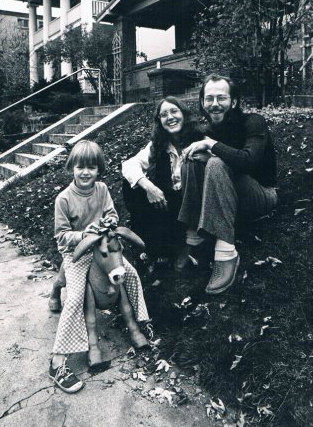 JULEE: Haha! I guess I was a smart, shy kid. Always got good grades and liked art and animals. I was the only child of an independent, single mom so that probably influenced me to be DIY.
JULEE: Haha! I guess I was a smart, shy kid. Always got good grades and liked art and animals. I was the only child of an independent, single mom so that probably influenced me to be DIY.
MARK: What can you tell me about your mom?
JULEE: She’s great. She always worked clerical jobs and raised me singlehandedly (some boyfriends would step in from time to time) since I was 9 months. We had great times!
MARK: What was the best thing to come from McJob?
JULEE: I got to meet (via mail) a lot of other like-minded people, some of whom I’ve since found on Facebook (like you!). So I’d say the best thing is the long-term friendships.
MARK: I always thought of zine publishing as the modern day equivalent of putting a message in a bottle and casting it into the sea… You write something, you chuck it out into the universe, and then you wait to see what, if anything, comes back to you… At least I think there was that kind of zen-like kind of side to it for me. (Of course, for the most part, that was obscured by my obsessive mailbox checking, constant fear of not being liked, and general free-floating anxiety.) I’m curious if you have an an alternate metaphor that you think better sums up the the whole thing up…
JULEE: Your’s is a good analogy… My favorite aspect, though, was having complete control over my project, getting to do it exactly as I liked, and not having to answer to anybody.
MARK: My sense was, back in the day, there were a lot fewer women involved in zines than there are today. Was that your sense as well? And, if so, did that present particular challenges for you?
JULEE: I actually disagree. I remember going through Factsheet Five and never thinking that there was a disparity in terms of sex. But, it could also be that I’m remembering the mail art scene, as mail art and zines were always kind of intertwined for me. Maybe, strictly speaking, in terms of zines, there was a disparity. But I remember it being like artists today, about 50/50.
MARK: It’s interesting that you bring it up, as I’d kind of forgotten about the dividing line between mail art and zines. The cultures of both were pretty well documented by Factsheet Five, but they were pretty distinct groups. There was certainly cross-over. You’re a great example of that. But they were different animals.
JULEE: Yeah, two camps that overlapped at times. Mail art has such a rich history going back to the Fluxus artists of the 60s. I felt zines were more a newer phenomenon, but of course people had been self-publishing for years. The cheapness of photocopies really amped it up. But I think as long as there’s been the post office, there’s been mail art.
MARK: When you first had the idea for McJob, what did you do? How did you get word out to folks that you were looking for submissions?
JULEE: Good question. I don’t remember. Probably just through my network of zine friends and mail art people. It was all people I’d never met. I don’t think anyone I knew in person contributed. I liked to keep those worlds separate.
MARK: Just how separate did you keep things? Was it just that you didn’t ask your “real” friends to contribute, or did they not even know that McJob existed?
JULEE: I spent so much time alone in my room writing to people and making correspondence art that I think I inadvertently only looked there for contributors. I do remember that, when I traveled, I would always visit the people I wrote to, if I were in their area. I actually met a lot of people I wrote to that way, and even ended up dating one long distance. I did run ads for some of my “real” friends’ businesses in McJob. And I believe they knew about it.
MARK: Had you heard the phrase “McJob” prior to launching the zine, or, to the best of your knowledge, did you come up with it?
JULEE: Another good question. I think I’d heard of it, but it was still a new term. Actually, it might have been from Douglas Coupland’s book Generation X, which was a big influence on me at the time.
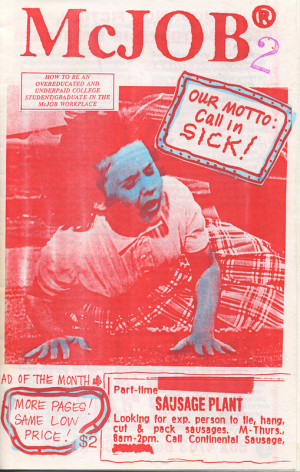 MARK: What was it about Generation X that resonated with you?
MARK: What was it about Generation X that resonated with you?
JULEE: It was the first book to speak to how I was feeling at the time. I remember in the margins of the book were words Coupland made up to describe our generation like “Boomerang Baby” (or something) whose definition was “when, after completing college, the child returns to live with the parents due to financial instability or lack of ambition” (or something). I had just done the same thing. After graduating college, the only job I could get was as a newspaper boy (I mean girl, I guess). It was a miserable job, and I moved back home because I was broke. Probably the most depressing time of my life.
MARK: So, were you publishing McJob when you were living with your mom?
JULEE: I was only home for about six months, and it was before McJob.
MARK: Do you remember your first Factsheet Five review for McJob?
JULEE: Hmmm, I don’t. But anytime you got reviewed in Factsheet Five, a slew of orders or at least correspondence was sure to follow. I loved that!
MARK: What, in your opinion, was the best piece you ever ran in McJob?
JULEE: My own!
MARK: Is there a specific story that comes to mind?
JULEE: Maybe I wrote about the above newspaper job – I sure hope so!
MARK: You mentioned to me before setting out on this interview that you were somewhat reluctant to dredge up the past. I believe you said that you weren’t proud of the work you did back then. Do you care to elaborate on the subject? And, before you answer, I should add that I had a zine before Crimewave that I would be mortified if anyone saw today, so I’m totally sympathetic.
JULEE: Oh… now that you said that, you have to share your mortifying zine! …Well, I’m just a completely different person with completely different goals than back then. And my aesthetic sense is different. I don’t really stand behind some of my projects because they were gross, immature, lowbrow and badly designed. I cringe when I see some of the things I wrote. I don’t regret my zine days, but I think others’ zines were better organized and focused than my lot of weirdnesses. I had anger toward things that I don’t have anymore. It was exercised in McJob. I don’t feel the need to do that anymore. I’ve worked many a corporate jobs in the years since, and I’m fine with it. Though now I’m happy to be working for myself, where I have complete control over my projects, just like in the zine days.
 MARK: So, if you don’t mind my asking, what are you doing these days? …When you search “Peezlee + McJob,” this is one of the first images to come up. Are you now an airport hologram?
MARK: So, if you don’t mind my asking, what are you doing these days? …When you search “Peezlee + McJob,” this is one of the first images to come up. Are you now an airport hologram?
JULEE: I have no idea who that is…. I have my own company. For many years I was a graphic designer. I have to say that for the last six years, being my own boss with my own business, I LOVE my job! Finally!
MARK: If you don’t mind, can I ask what you do?
JULEE: I sell hand-sewn toys.
MARK: Do you have any old copies of McJob in a box somewhere? I just discovered that a copy of issue three is selling for $75 online. You might be sitting on a goldmine.
JULEE: I had no idea and I have to say holy fuckin’ shit. But I think I know who that seller is. It’s a person who I used to trade zines with back in the day. Good luck getting $75 for that, my friend! Too funny. And slightly weird. There are a few boxes in my apartment that might contain the last remnants of the Dyslexic empire but at this moment in time, I am too lazy to even stand on the table and reach up to the top shelf and pull them down. Maybe tomorrow. Right now, I’ve got sewing to do.
UPDATE: Here, for those of you who have never seen an issue of McJob, is a bit of detail from issue #4.
UPDATE: Interested in more? Here are links to a few more pages: I, II.
[If you like what you’ve read and want more about the underground press and the people behind it, be sure to check the other interviews in the History of Zines series.]

